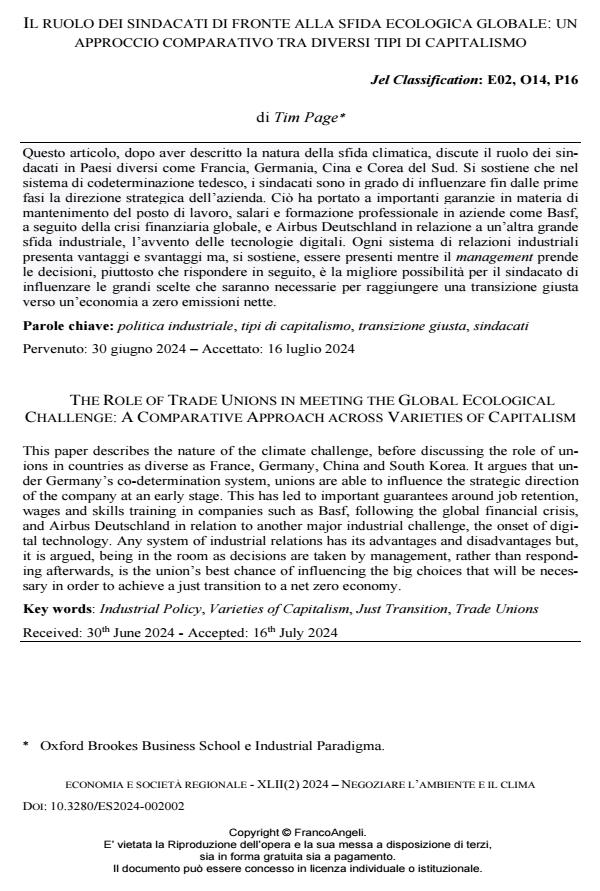The role of trade unions in meeting the global ecological challenge: a comparative approach across varieties of capitalism
Journal title ECONOMIA E SOCIETÀ REGIONALE
Author/s Tim Page
Publishing Year 2024 Issue 2024/2
Language Italian Pages 12 P. 13-24 File size 246 KB
DOI 10.3280/ES2024-002002
DOI is like a bar code for intellectual property: to have more infomation
click here
Below, you can see the article first page
If you want to buy this article in PDF format, you can do it, following the instructions to buy download credits

FrancoAngeli is member of Publishers International Linking Association, Inc (PILA), a not-for-profit association which run the CrossRef service enabling links to and from online scholarly content.
This paper describes the nature of the climate challenge, before discussing the role of unions in countries as diverse as France, Germany, China and South Korea. It argues that under Germany’s co-determination system, unions are able to influence the strategic direction of the company at an early stage. This has led to important guarantees around job retention, wages and skills training in companies such as Basf, following the global financial crisis, and Air-bus Deutschland in relation to another major industrial challenge, the onset of digital technol-ogy. Any system of industrial relations has its advantages and disadvantages but, it is argued, being in the room as decisions are taken by management, rather than responding afterwards, is the union’s best chance of influencing the big choices that will be necessary in order to achieve a just transition to a net zero economy.
Keywords: Industrial Policy, Varieties of Capitalism, Just Transition, Trade Unions
Jel codes: E02, O14, P16
- Abraham J. (2017). Just Transitions for the Miners: Labor Environmentalism in the Ruhr and Appalachian Coalfields. New Political Science, 39(2): 218-240. DOI: 10.1080/07393148.2017.1301313
- Breda T. (2015). Firms, Rents, Workers’ Bargaining Power and the Union Wage Premium. Economic Journal, 125(589).
- Chang H-J. (2008). Bad Samaritans. London: Random House. Random House Business Books.
- Chonghee H, Jiho J e Sunhyuk K. (2010). Social Dialogue and Industrial Relations in South Korea: Has the tripartite commission been successful?. Asia Pacific Viewpoint, 51(3).
- Galgóczi B. (2020). Just Transition on the ground: Challenges and opportunities for social dialogue. European Journal of Industrial Relations, 26(4). DOI: 10.1177/0959680120951704
- Gilley B. (2012). Authoritarian environmentalism and China’s response to climate change. Environmental Politics, 21(2): 287-307. DOI: 10.1080/09644016.2012.651904
- Gilpin R. (2011). Global Political Economy. Princeton: Princeton University Press.
- Guo R., Laroche P. (2021). The effects of trade unions on economic performance: evidence from Chinese provincial-level data. International Journal of Manpower, 42 (6): 1084-1101. DOI: 10.1108/IJM-11-2018-0369
- Hall P.A., Soskice D., Eds (2001). Varieties of Capitalism: The Institutional Foundations of Comparative Advantage. Oxford: Oxford University Press.
- Hobsbawm E. (1977a). The age of revolution. 1789-1848. London: Abacus.
- Hobsbawm E. (1977b). The age of capital, 1848-1875. London: Abacus.
- HØGEDAHL L. (2014). THE GHENT EFFECT FOR WHOM? MAPPING THE VARIATIONS OF THE GHENT EFFECT ACROSS DIFFERENT TRADE UNIONS IN DENMARK. INDUSTRIAL RELATIONS JOURNAL, 45(6): 469-485.
- Hu A. (2015). Embracing China’s New Normal. Foreign Affairs, 94(3) -- <https://www.foreignaffairs.com/articles/china/2015-04-20/embracing-chinas-new-normal>.
- Ipcc - Intergovernmental Panel on Climate Change (2023). Climate Change Synthesis Report -- <https://www.ipcc.ch/report/ar6/syr/downloads/report/IPCC _AR6_SYR_LongerReport.pdf>.
- Kohler B. (2014). Sustainability, Just Transition and Trade Unions. Global Labour Column, 185 -- <https://global-labour-university.org/wp-content/uploa ds/fileadmin/GLU_Column/papers/no_185_Kohler.pdf>.
- Lichao Y., Walker R. (2024). China and Climate Change: Just transition and social inclusion. Social Inclusion, 12, Editorial 8050: 1-12.
- Marx K. (1852). Der 18. Brumaire des Louis Bonaparte -- <https://www.degruyte r.com/document/doi/10.1515/9783050076058-006/html>.
- Page T. (2012). German Lessons: developing industrial policy in the UK. Trades. Union Congress (UK) -- <https://radar.brookes.ac.uk/radar/file/c130e708-f51b-4969-9fc2-ac1d448cdaab/1/Page2022TradeUnion.pdf>.
- Page T. (2016). Powering Ahead: How UK industry can match Europe’s environmental leaders. Trades Union Congress (UK) -- <https://radar.brookes.ac.uk /radar/file/c130e708-f51b-4969-9fc2-ac1d448cdaab/1/Page2022TradeUnion. pdf>.
- Page T. (2017). Shaping our Digital Future. Trades Union Congress (UK) -- <https://radar.brookes.ac.uk/radar/file/c130e708-f51b-4969-9fc2-ac1d448cd aab/1/Page2022TradeUnion.pdf>.
- Page T. (2020). Voice and Place: how to plan fair and successful paths to net zero emissions. Trades Union Congress (UK) -- <https://www.tuc.org.uk/sites/ default/files/2020-08/Just%20Transition%20final_Contents_Updated_MN %20%281%29.pdf>.
- Taylor B., Qi L. (2007). Is the Acftu a union and does it matter?”. Journal of Industrial Relations, 49(5): 701-715. DOI: 10.1177/0022185607082217
- Wadanambi R.T., Wandana N.S., Chathumini K.K.G.L., Dassanayake N.P., Preethika D.D.P., Udara S.P.R. Arachchige (2020). The effects of industrialisation on climate change. Journal of Research, Technology and Engineering, 1 (4) -- <https://www.jrte.org/wp-content/uploads/2020/10/The-Effects-Of-Industrialization-On-Climate-Change-1-1.pdf>.
- Vogel E. (1991). The Four Little Dragons. Cambridge, Massachusetts and London, England: Harvard University Press.
- Zhou R. (2024). From Education for a Sustainable Development to Ecological Civilization in China: A Just Transition? Social Inclusion, 12
- The role of trade unions as experts in the industrial policy process: maximising the opportunity Tim Page, in Contemporary Social Science /2025 pp.470
DOI: 10.1080/21582041.2025.2587881
Tim Page, Il ruolo dei sindacati di fronte alla sfida ecologica globale: un approccio comparativo tra diversi tipi di capitalismo in "ECONOMIA E SOCIETÀ REGIONALE " 2/2024, pp 13-24, DOI: 10.3280/ES2024-002002